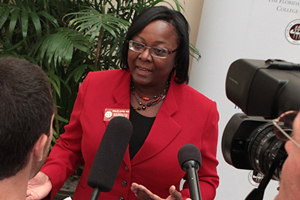FOR IMMEDIATE RELEASE
Aug. 11, 2010
Contacts:
Warren Jones, Tallahassee Memorial HealthCare, (850) 431-5875
Doug Carlson, Florida State University College of Medicine, (850) 645-1255
 Tallahassee, Fla. – The Tallahassee Memorial HealthCare Board of Directors and the Florida State University College of Medicine today announced plans to pursue a joint internal medicine residency program for the Big Bend region. The Tallahassee Memorial and Florida State University Internal Medicine Residency Program would be housed at Tallahassee Memorial's main campus and The Florida State College of Medicine would be the institutional sponsor. The program could begin accepting applications for resident physicians as early as fall 2011.
Tallahassee, Fla. – The Tallahassee Memorial HealthCare Board of Directors and the Florida State University College of Medicine today announced plans to pursue a joint internal medicine residency program for the Big Bend region. The Tallahassee Memorial and Florida State University Internal Medicine Residency Program would be housed at Tallahassee Memorial's main campus and The Florida State College of Medicine would be the institutional sponsor. The program could begin accepting applications for resident physicians as early as fall 2011.
Florida ranks No. 4 in population but No. 44 in the number of graduate medical education slots for residency programs. Recent legislation will soon allow many vacant residency slots to be transferred to new regions and hospitals. While the number of residency training slots remains capped at 100,000 through 1997’s Balanced Budget Act, according to the Association of American Medical Colleges, about 1,000 slots are expected to shift toward states with a shortage of slots compared to overall population. Florida is expected to receive approximately 300 slots. The bill also gives preference to teaching hospitals that focus on primary care and general surgery residencies, emphasize community-based training, and are located in areas with growing populations, criteria that Tallahassee Memorial Hospital satisfies on all counts.
“Tallahassee Memorial Hospital has the opportunity to expand medical training and care on our campus for the benefit of our region’s citizens and graduating medical students. The program will also complement Tallahassee Memorial’s already strong Family Medicine Residency Program, which has served our community so well,” said Mark O’Bryant, president and CEO of Tallahassee Memorial HealthCare.
Since 1973, 301 physicians have completed their training through the Family Medicine Residency Program with more than half selecting to practice in Florida, including 97 in the Tallahassee community. As studies show that roughly 60 percent of doctors practice where they complete their residency, a second program at Tallahassee Memorial would bring many new physicians to our region, aiding the state in facing its longstanding challenge to retain doctors.
“While the FSU College of Medicine is committed to training the kinds of doctors that Florida needs the most, we can do only part of the job,” said College of Medicine Dean John P. Fogarty, M.D. “This year, 60 percent of our graduating seniors left the state to pursue their residency training. It is critical that we develop new programs to train these residents locally to keep them here in Florida.
“It is wonderful to partner with TMH in this endeavor and build on the record of success they have had with the family medicine residency program. Internal medicine is the next logical step to increase the primary care workforce here in Tallahassee.”
Graduates of the program would be equipped with three years of training in the field of internal medicine, a specialty dealing with the prevention, diagnosis, and treatment of adult diseases. These physicians would have the expertise to help solve puzzling diagnostic problems and could use their comprehensive medical knowledge to serve as primary care doctors or specialists in fields such as cardiology or endocrinology.
“The Tallahassee Memorial and Florida State University Internal Medicine Residency Program will attract a greater number of physicians to the Panhandle, improve access to care and eventually pave the way for additional joint residency initiatives in specialties such as general surgery and emergency medicine,” O’Bryant said. “We are elated that the Florida State College of Medicine is united with us in this common goal.”
“As the nation’s newest medical school with graduates, we see the development of additional residency training programs as a natural next step for us,” said Alma Littles, M.D., senior associate dean for medical education and academic affairs at the College of Medicine.
“In addition to the fact that doctors are more likely to practice where they complete residency, residency programs also serve as the only access to care for many patients in the area where they are located.”

